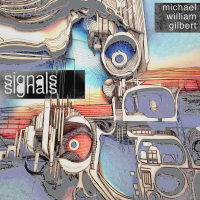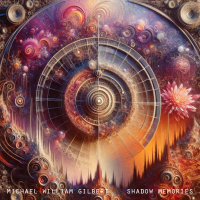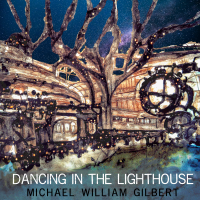Updated: October 19, 2024
Born: August 17, 1954
Michael William Gilbert's musical journey has transcended boundaries from an early age. Growing up between Connecticut and Brussels, his ears were opened to the avant-garde experimentalism of Varese, Stockhausen, and Pierre Henry, as well as the rich tapestries of Indian, African, and Japanese traditions. But it was his immersion in Miles Davis' pioneering electric period that truly sparked his passion for melding jazz and electronic frontiers.
After studying electrical engineering at MIT and electronic music at the Boston School of Electronic Music, Gilbert's talents as a synthesizer composer, designer, and teacher took root. He served as technical director of electronic music studios at Amherst College, Smith College, Hampshire College, and UMass/Amherst. Over his career he has experience teaching electronic music at UMass Amherst, Holyoke Community College, and Hampshire College. In parallel, he had a nearly 30-year career as the Adviser for Technology Initiatives and Services at UMass Amherst before retiring to focus full-time on music.
But his calling as a composer burned brightest. In 1978, he released "Moving Pictures", a debut album aimed at "humanizing electronic music" by weaving wooden flutes, percussion, and vocals amid synthesized atmospheres.
This seamless melding of acoustic and electronic realms continued to deepen. On "The Call", Gilbert's improvised solo lines danced amid washes of drone, percussion and avant-garde soundscapes inspired by Asian tonalities. The dreamlike textural landscapes of "In the Dreamtime" took this approach even further, blending new jazz, world music influences, and imaginative collaborations with artists like Tim Moran and David Moss.
One of the first independent artists to transition to CDs, Gilbert's "The Light in the Clouds" fused rhythmic influences from African, Jewish, Christian and Shinto music into a mesmerizing, crystalline whole. The follow up solo tour-de-force "Point of Views" captured an ethereal ensemble sound, with Gilbert's deft MIDI sequencing creating an "ethereal and beautiful blend" of jazz, world, and electronic elements.
After reemerging with the eclectic "Other Voices" and "I Can See from Here" (featuring Peter Kaukonen of Jefferson Starship, Hot Tuna, Black Kangaroo, and Johnny Winter), Gilbert reached new heights of ambition on "Secret Stories." Conceived for live performance, it's a kaleidoscopic opus spanning electronic music's past and future, jazz, classical, and world traditions.
His most recent offerings have only pushed his genre-blurring farther. From the radiophonic-inspired "The Vanished Day" to lush, immersive collaborations with Miles and Steven Wilson alumnus Adam Holzman like "Saṃsāra", Gilbert's music remains an ever-evolving, boundaryless frontier of sound and spirit. His most recent release, “Enhanced Surround(ings), is an album and compilation of music originally in stereo, totally remixed and remastered for both Dolby Atmos™ and binaural immersive sound.
Read moreTags
All About Jazz Articles
Michael William Gilbert: Radio Omnibus

by Geannine Reid
Computers and technology have changed our lives in so many ways that it is hard to fathom the speed in which our lives have transformed. This rapid transformation also applies to music. Home studios and digital distribution for the modern-day artist allows more musicians per capita to get their music heard on a larger scale. What has also changed is the ability for musical instruments and sound emulation of acoustic instruments to capture the warmth and natural acoustics of an ...
Continue ReadingMichael William Gilbert: Radio Omnibus

by Mike Jurkovic
Much electronic music seems to fall into three distinct categories: 1) droning angst, dredged from the primordial soup, given a beat to get tribal to; 2) wash upon wave upon wash of textured android spirituality; 3) hugely unlistenable, period. But Michael William Gilbert's Radio Omnibus has a humor to it, and where humor is, lies a heart behind it. Gilbert, a retired Advisor for Technological Initiatives and Services for the University of Massachusetts, doesn't engage in electronica with ...
Continue ReadingMichael William Gilbert: I Can See From Here

by C. Michael Bailey
If the NPR radio show, Hearts of Space, were hipper and less ambient, it would fall over itself playing Michael William Gilbert's I Can See From Here. The recording is a 14-part suite, made up of Gilbert compositions synthetically prepared by the composer. Gilbert plays all instruments--that is, synthesizer, computer samples and loops, as well as percussion, and is joined on “Amerikan Dream" by guitarist Peter Kaukonen, the younger brother of Jorma Kaukonen (Jefferson Airplane, Hot Tuna). ...
Continue Reading“One of the best albums of pure musical bliss I have heard in a while is I Can See From Here by Michael William Gilbert. It is a breath of fresh air in today's musical landscape too often cluttered with the average. I Can See From Here gives new life to styles of music rarely, if ever, heard on modern radio. The songs are expertly crafted, and the flow of the album definitely had me wanting more at its finale. A very well timed release, potentially worthy of a 2011 Grammy nomination. - Cashbox “If the NPR radio show, Hearts of Space, were hipper and less ambient, it would fall over itself playing Michael William Gilbert's I Can See From Here…Gilbert approaches his task multi-focally, generating first a sonic-rhythmic landscape over which to spread his sound colors: everything from electric piano and Fender jazz bass, to vibraphone and human voices

































